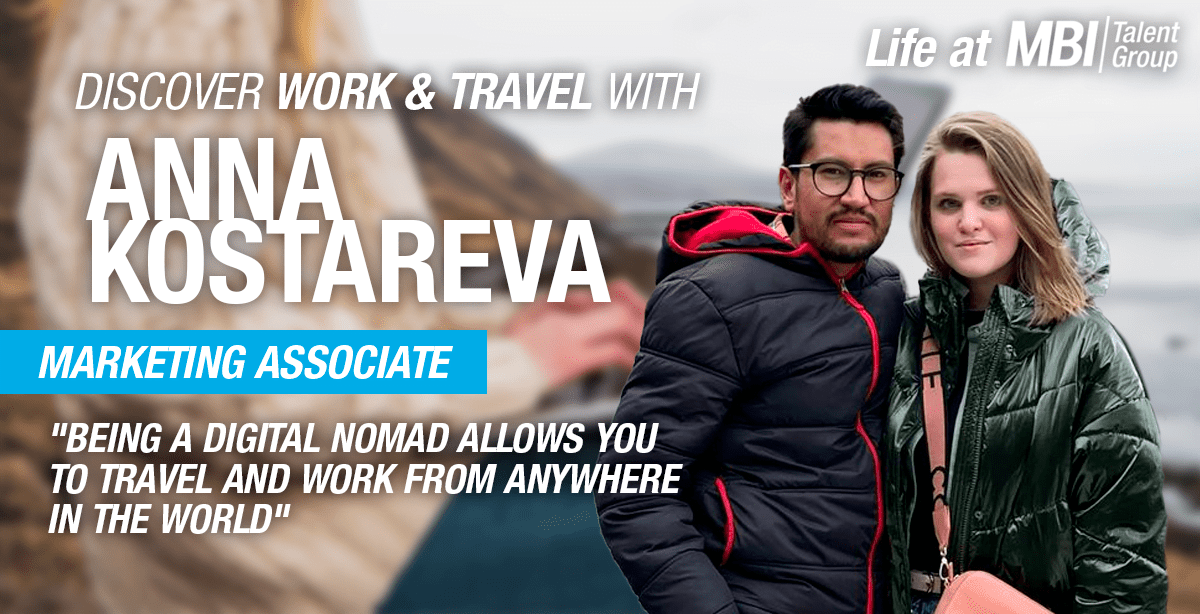“Being a digital nomad allows you to travel and work from anywhere in the world” — Anna Kostareva
The concept of “digital nomad” is given to those professionals who work remotely taking advantage of new technologies to work from anywhere, although most of them travel.
It is a growing trend that reaches 10.2 million digital nomads, and it is expected that this value will continue to grow in the coming years, boosted by new generations and technology.
To learn more about what it’s like to work and travel, Anna Kostareva, Marketing Associate at MBI Talent Group, shares her experience traveling around the world while working.
Travel, work & a lifestyle
Anna was born in Russia, but since 2016 she does not live in her country. First, she went to Spain and then to Quito, Ecuador, where she currently lives. She has recently traveled through several countries to reach her homeland, passing through Colombia, Turkey, and Georgia.
In her own words, “A digital nomad experiences freedom by being an independent person who works using the internet and doesn’t need to go to the office every day”. In consequence, you can work from anywhere in the world!
According to statistics from Global Workplace Analytics, people feel 80% freer by not having to attend a workplace. Although it sounds simple as pie, digital nomadism is not for all workers, as the lifestyle is often solitary and hurried.
Anna believes that there are people who need to be in the office to create the work environment; after the pandemic, many people were annoyed by this “Home Office” style, as they could not evolve to the changes that the day-to-day was asking for.
What is digital nomadism?
Although digital nomadism sounds like fun, it can be tiring and overwhelming for what it represents. Our habits have changed and with it, many of our customs.
For Anna, the only problem with working from home is that she finds it difficult not to wear pajamas during the day. It may sound incredible, but for many digital nomads, it’s not important to be dressed up for work.
Beyond technical skills, there are several personal competencies that they need to be successful:
- Time management and organization
- Autonomy
- Productivity
- Technological adaptability
- Curiosity
- Discipline
- Ability to network
“You can’t get wrapped up in other things and want to know the country where you are traveling, you have to understand and separate the trip from work” — Anna Kostareva.
Finding the perfect balance between travel and work is not an easy task, you have to make a difference to find the middle ground.
While living, traveling, and working remotely sounds very positive, digital nomads face many challenges. The constant search for remote clients, maintaining international health coverage, coordinating communication schedules (both professional and personal) with very distant time zones, handling international payments, constant currency changes, abiding by very different local laws, and keeping a minimal but important amount of belongings, among other things.
For Anna, the risk you have while working like this is enormous because the lack of established schedules, the absence of interaction, and not leaving home make you lose track of time and not enjoy your personal life.
Tips for a successful nomadic life
Some tips for a successful nomadic life are:
- Do not mix personal life with work
- Set boundaries between travel and work
- Have an organized agenda
- Know the risks of each country and take them in the best way
- Knowing how to act in each environment to find a balance
The freedom she mentions at the beginning is reflected in her desire to travel and although there are some countries where the situation does not allow her to work 100% digitally, Anna loves her work on social networks.
Nowadays, companies have within their ranks many people working digitally, it is estimated that around the world almost 35% of employees are digital nomads. The ease of access to this type of work is increasing and from her experience, she gives some suggestions for companies that want to implement this model:
- Giving people the freedom on their own schedules
- Results-only work environment
- Trust people to do their job
- Allow employees to be who they are
How can I start in digital nomadism?
On the other hand, for people who want to get started in digital nomadism, Anna advises:
- Try to organize your time
- Organize your work schedule, outside your personal life
- Maintain a lifestyle that allows you to eat and do personal activities
- Be under the same rhythm as if you were in an office
Anna’s career at MBI Talent Group is 100% dedicated to marketing. Although she is a lawyer by profession, her passion for digital made her study several courses within the digital world. When she moved to Ecuador and practiced law, it was difficult to find a job because of the international legislation, that was the moment when she fell in love even more with what she does today.
“When you like your job, you are professional, you keep growing, you learn more, and you have to stop thinking negatively. Being afraid to jump into online work is valid, but you have to find what you are passionate about and look for opportunities. Don’t be afraid” — Anna Kostareva
As a final comment, she revealed that for her, life is about seizing opportunities, and options, grabbing them, and doing what you love.
Digital nomadism requires a good dose of independence, a predisposition to organize time, a high degree of professional responsibility, and a proactive attitude.
In addition to being able to work towards objectives, it also requires ingenuity and a spirit of adaptation to new places of residence. It is a very fascinating life choice, but certainly not suitable for everyone. Would you dare to try this lifestyle? Follow our blogs and social networks for more interesting information on this and other topics.










